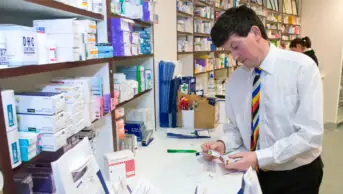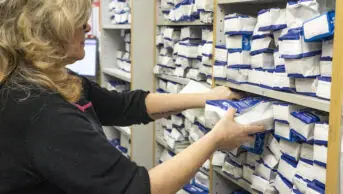
Shutterstock.com
Rarely a day goes by without a new headline about how much pressure GPs are under. The amount of bureaucracy and box ticking they face, an increasing number of patients to see, two years of pressures brought on by the COVID-19 pandemic — all to the detriment of their own health and mental wellbeing[1–3].
Pharmacists have been working in general practice for many years to help ease the workload. Their scope of practice is vast as they help support GPs for the safer prescribing of medication, chronic disease management, polypharmacy and structured medication reviews to improve patient outcomes[4].
With the creation of primary care networks (PCNs) and the development of the additional roles reimbursement scheme (ARRS) in 2019, the input of pharmacists in general practice was set to increase as NHS England implemented targets to recruit five clinical pharmacists into each PCN across the country by 2024[5].
However, the results of this recruitment drive — through which 3,422 pharmacists are now working in PCNs through the ARRS — have been mixed[6].
Undervalued
In March 2022, the King’s Fund — an independent think tank — published a report that said pharmacists working in PCNs are “underappreciated” by GPs, saying that “they were not being given tasks appropriate to their competencies” and that “having a critical mass of pharmacists and technicians, with leadership support, was important”[7].
I feel a great sense of responsibility for the significant amount of time and resource being squandered across the country
From my experience as a senior clinical pharmacist working at a PCN, it is concerning that the report has not been taken seriously, with the issues described allowed to continue at a time when the NHS is understaffed and underfunded[8]. I feel a great sense of responsibility for the significant amount of time and resource being squandered across the country, and it is the cash-strapped taxpayer footing the bill.
In my 20 years of working as a pharmacist, I have taken on many different roles. In primary care, I worked for primary care trusts and then clinical commissioning groups as a care home pharmacist, before moving on to be directly employed by a surgery with a team of GPs, nurses, healthcare assistants and administration staff to care for our patients.
I was carrying out medication reviews, medicines reconciliation, managing high-risk drugs, and implementing new policies and protocols to ensure safe prescribing, all while managing my own caseload of patients. I felt respected and valued as an important member of the team. Primary care was finally starting to see what pharmacists could offer. I became an independent prescriber and, after several years, I was fully competent to move on to a senior position within a PCN.
However, the use of pharmacists in the PCN I joined concerned me greatly. Junior pharmacists had been employed into a training role but had not been provided with any guidance by either the PCN or the practices who showed very little understanding or interest. In line with the findings from the King’s Fund report, it quickly became apparent that there was a lack of leadership, management and structure within this PCN. The junior pharmacists were despondent and felt totally isolated from the practices. There was no opportunity for them to put what they had learned into practice and, ultimately, patients were missing vital medication related input from pharmacists, compromising patient safety.
Trying to work together
My job was to mentor the other pharmacists and implement what I had learned during my previous work in general practice. To do this, I needed to get the practice managers on side. This powerful group of individuals were vital to enabling me to succeed. So, I set up meetings with practice managers and lead GPs to explain the PCN contract requirements, to set out our objectives as pharmacists and to agree a way of working. My team and I sent out monthly newsletters to ensure practices were aware of our work and our successes. We met with the wider practice team to explain our role and tried to integrate into the practices.
On the surface, the majority of GPs seemed pleased that pharmacists could manage some of the more complex polypharmacy patients and help with queries, but the practice managers had other concerns. There were several patronising comments and, in some cases, outright hostility about historical grievances that did not even concern PCN pharmacists. They felt we were writing self-congratulatory newsletters when the intention had been to provide information and open channels of communication.
A practice manager once told me her staff were too busy to book patients in for pharmacists. She could not understand that my patient was actually her patient, registered at the practice she managed. The expectation was that the pharmacists were to do their own administration, even though other clinical staff do not. There appeared to be no understanding that cold calling patients for a medication review is unsuccessful, because the patient is not expecting the call and, as a result, either does not answer or is unprepared for an in-depth conversation about their medicines. This is inefficient use of clinical time that could be best used elsewhere.
Lack of progress
After one year, our pharmacy team still cannot access a clinic room on a regular basis. This means we cannot see patients face to face, limiting the cohort of patients we can see. Some practices do not encourage remote working but also do not have space for us. This has led to some of the pharmacists working in the noisy computer server room, in the cold medication storage room, or the tearoom with constant interruptions by staff taking a break, meaning that patient telephone calls are difficult to arrange. I am not trusted to request blood tests via T-quest, which results in several tasks to reception, missed tests and repeat appointments. This is highly inefficient and a waste of everyone’s time.
The problem seems to stem from a lack of understanding that pharmacists are, in fact, clinical staff
The problem seems to stem from a lack of understanding that pharmacists are, in fact, clinical staff. A study published in 2018, which found that pharmacists in general practice lack clinical support from GPs, suggests this is a long-running issue[9].
In my experience and within my PCN, the situation has not improved, and pharmacists are still not seen as clinicians. While GPs seem comfortable with pharmacists doing basic tasks that they do not have time to do themselves, such as medicines reconciliation, answering queries and managing stock shortage issues, they neither appreciate the scope of our expertise nor do they wish to be involved in upskilling pharmacists[7,9].
There is more that we can offer. In October 2022, an investigation carried out by The Pharmaceutical Journal revealed a “worrying” increase in the number of patients taking two or more medicines with moderate or high anticholinergic activity[10]. What is the point in our expertise being used for a simple two or three drug medication review when we could be helping to manage these patients instead? I echo calls made by researchers for GPs to recognise that pharmacists require additional supervision to develop the skills needed to perform structured medication reviews as intended, with the aim of addressing problematic polypharmacy and reduce avoidable hospital admissions[11].
Support from GPs
I hasten to add that some GPs do understand the unique skillset that pharmacists can bring to the table. These are the GPs who recognise that the current system does not work for patients and agree that we need to be able to think differently, strategically and find a new way of working.
There are examples all over the country where patients have benefited from the expertise of pharmacists. For example, the pharmacy team at Sunderland PCN led a deprescribing effort that led to a 3.2% reduction in the number of patients prescribed antidepressants in 2021/2022[12]. Meanwhile, the pharmacy team at Chesterfield and Dronfield PCN led the network’s COVID-19 vaccination service in 2021[13].
Recently, a GP at my PCN who had been particularly negative about the ARRS roles, including clinical pharmacists, apologised and wanted to inform me that she was now a firm advocate for the role having reviewed some of the team’s SMRs. A small win — but an incredibly important one.
However, until pharmacists are universally valued for their expertise in general practice, and a robust structure is put in place, pharmacists will continue being underutilised and morale will continue to diminish but, more importantly, patients will miss out on pharmacists’ expertise.
In my previous job, I was fortunate to be part of an innovative, forward-thinking team. I have received some fantastic feedback from patients and I know I have made a difference: this is the reason I remain in my job.
Over the past year, I feel some of these barriers are slowly coming down. Realistically, I do not expect all our issues to be resolved quickly, but it is certainly a welcome and much needed change. For pharmacists wishing to take on a PCN role: read the contract and job description, ensure everything you need is in writing. Ask the right questions: who is going to support you? Who can you go to ask for help on a day-to-day basis? Where will you be working? And stay away from internal politics.
Anonymous primary care network pharmacist
- 1Zegalska J. GPs issuing 9.5% more fit notes than before the pandemic . Pulse Today. 2022.https://www.pulsetoday.co.uk/news/workload/gps-issuing-9-5-more-fit-notes-than-before-the-pandemic/ (accessed Dec 2022).
- 2Zegalska J. GPs clock over 200 patient contacts a day, campaign reveals. Pulse Today. 2022.https://www.pulsetoday.co.uk/news/workload/gps-clock-over-200-patient-contacts-a-day-campaign-reveals/ (accessed Dec 2022).
- 3Jefferson L, Golder S, Heathcote C, et al. GP wellbeing during the COVID-19 pandemic: a systematic review. Br J Gen Pract. 2022;72:e325–33. doi:10.3399/bjgp.2021.0680
- 4Network Contract Directed Enhanced Service (DES) Contract Specification 2020/21 – Primary Care Network Entitlements and Requirements. NHS England. 2020.https://www.england.nhs.uk/publication/des-contract-specification-2020-21-pcn-entitlements-and-requirements (accessed Dec 2022).
- 5Every primary care network to get £38,000 to fund new clinical pharmacist role in 2019. The Pharmaceutical Journal. 2019. doi:10.1211/pj.2019.20206082
- 6Primary Care Network Workforce. NHS Digital. 2022.https://digital.nhs.uk/data-and-information/publications/statistical/primary-care-network-workforce/30-september-2022 (accessed Dec 2022).
- 7Pharmacists ‘underappreciated’ for their work in primary care networks, report finds. Pharmaceutical Journal. 2022. doi:10.1211/pj.2022.1.134571
- 8NHS leaders facing real-terms cut in funding and “impossible choices” over which areas of patient care to cut back. NHS Confederation . 2022.https://www.nhsconfed.org/news/nhs-leaders-facing-real-terms-cut-funding-and-impossible-choices-over-which-areas-patient-care (accessed Dec 2022).
- 9Practice pharmacists lack support from GPs, study finds. The Pharmaceutical Journal. 2018. doi:10.1211/pj.2018.20205379
- 10‘Worrying’ rise in number of patients with a high anticholinergic burden. Pharmaceutical Journal. 2022. doi:10.1211/pj.2022.1.161473
- 11Pharmacist medication reviews not putting patient outcomes first, claim researchers. Pharmaceutical Journal. 2022. doi:10.1211/pj.2022.1.142669
- 12How we dropped down from being in the top five highest prescribers of antidepressants in England. Pharmaceutical Journal. 2022. doi:10.1211/pj.2022.1.150168
- 13Our pharmacy team is leading our PCN’s COVID-19 vaccination service — and it feels electric. Pharmaceutical Journal. 2021. doi:10.1211/pj.2021.1.43319
2 comments
You must be logged in to post a comment.



I applaud this excellent, heartfelt, and candid opinion piece about pharmacy professionals being undervalued and poorly utilised within Primary Care Networks (PCNs) in England. Sadly, I also hear this a lot in my various working arenas, especially when teaching on the national Academic Health Science Network’s (AHSN) Polypharmacy Action Learning sets, and have written often, with my colleagues and allies , about why medicines experts are a necessity, not a luxury, in general practice (1-3)
As a former consultant pharmacist in acute medical care and medication safety who pivoted to work in primary care in a different NHS region, I would therefore offer the following succinct & pragmatic words of encouragement, about what can be a very harsh and tricky environment, and because, sadly, you can’t avoid personalities or politics in any job!
1 Be visible, have a medicines optimisation (MO) vision and share it often so pharmacy, medical, allied health professional, managerial teams are crystal clear what medicines experts can, and shouldn’t, do to improve patient care, improve medicines systems and safety, and save GPs time
2 Seek out respected GPs (ideally, but not necessarily, the prescribing lead) and managerial/administrative allies who have influence at a PCN board level as soon as possible once you are clear about the lay of the land. Use your patient honed communication skills to reach mutually beneficial outcomes
3 Ensure all pharmacy professionals document all clinical activities in patients’ clinical records and then agree what process and outcome data the PCN wants presented on a monthly or quarterly basis via a PCN wide medicines optimisation meeting
4 Set up the quarterly PCN wide medicines optimisation meeting chaired by the most respected prescriber but including all GP prescribing leads, senior pharmacy professionals, a community pharmacist lead plus Integrated Care Board (ICB) MO and PCN board representatives. Use national comparative MO data sets to help everyone see how well, or not so well, you fare compared with other PCNs in the ICB and understand / “buy into” the scale of sub-optimal medicines use
5 Go around obstructive practice / PCN personnel via 1, 2, 3, 4
6 Make sure you have agreed non-clinical sessions for thinking about, and dealing, with 1-5
7 Speak to other Additional Roles Reimbursement Scheme (ARRS) senior staff who may also have similar issues and can also help with 5
8 Ensure you have a personal mentor or coach outside your place of work and tap into any ICB wide pharmacy professional networks (What’s App groups and /or more formal groups) for reassurance, belief, and invigoration.
If I can help further feel free to drop me a line @STEVECHEMIST on Twitter
You have got this……..
Steve Williams
Senior Clinical Pharmacist
Poole Bay and Bournemouth PCN
Founder / Owner of One Less Pill Ltd
References
1 Williams SD, Hayes JM, Brad LD. Clinical pharmacists in general practice: a necessity not a luxury? British Journal of General Practice. Br J Gen Pract 2018; 68 (667): 85. DOI: https://doi.org/10.3399/bjgp18X694697
2 Williams SD, Hayes JM, Brad LD. Clinical pharmacists within primary care networks: a driver for collaborative general practice BJGP Life June 17th 2020 https://bjgplife.com/2020/06/17/clinical-pharmacists-within-primary-care-networks-another-driver-fo1 r-collaborative-general-practice/
3 Williams SD, Brad L, Jones D, Hayes J. Pharmacy professionals are part of the solution to reduce GPs’ workload BMJ 2021;373:n1176 https://doi.org/10.1136/bmj.n1176
Brilliant. Thanks for this article! I’m going to try and share it with our PCN Manager to help planning better use of our time. My PCN is receptive and interested, hopefully will be a positive outcome.